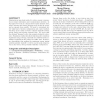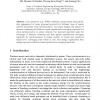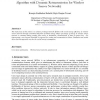159 search results - page 4 / 32 » Optimal dynamic sleep time control in Wireless Sensor Networ... |
EENERGY
2010
13 years 10 months ago
2010
Sleeping is an important method to reduce energy consumption in many information and communication systems. In this paper we focus on a typical server under dynamic load, where en...
FSKD
2005
Springer
13 years 11 months ago
2005
Springer
Core operations (e.g. TDMA scheduler, synchronized sleep period, data aggregation) of many proposed protocols for different layer of sensor network necessitate clock synchronizatio...
IJSNET
2006
13 years 6 months ago
2006
: In this paper, we present a two-tiered scheduling approach for effective energy conservation in wireless sensor networks. The effectiveness of this mechanism relies on dynamicall...
CORR
2010
Springer
13 years 6 months ago
2010
Springer
The main focus of this article is to achieve prolonged network lifetime with overall energy efficiency in wireless sensor networks through controlled utilization of limited energy...
MOBIHOC
2009
ACM
14 years 6 months ago
2009
ACM
We consider a high density of sensors randomly placed in a geographical area for event monitoring. The monitoring regions of the sensors may have significant overlap, and a subset...




